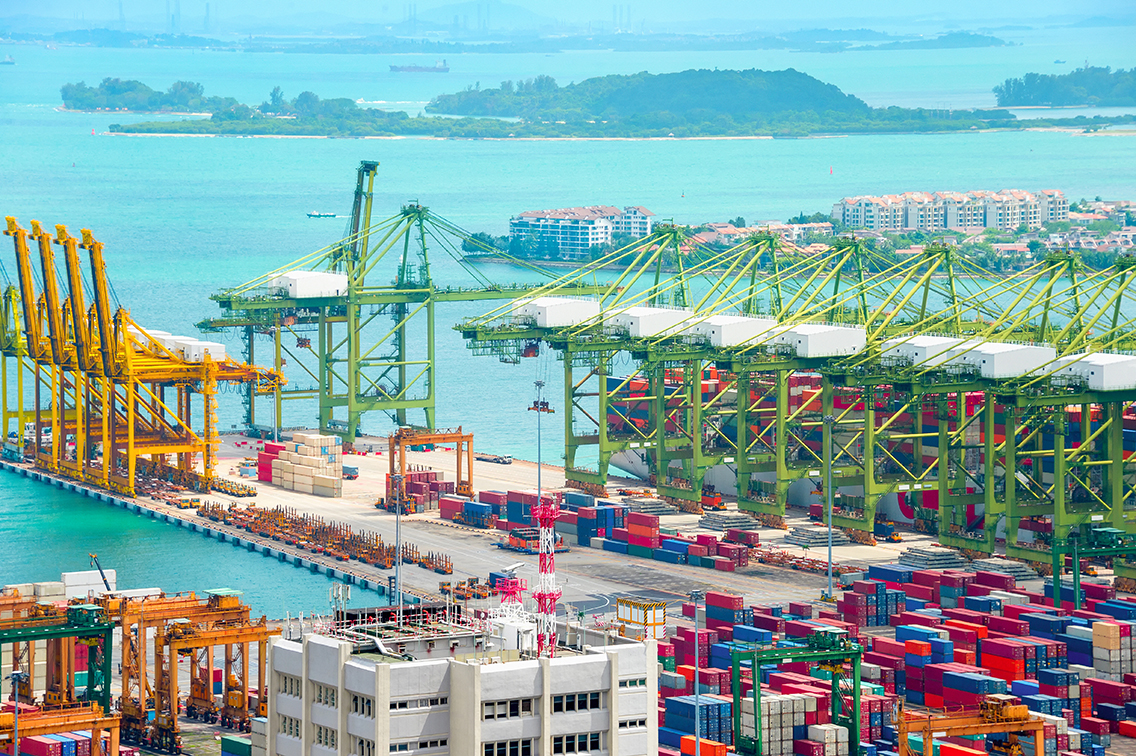Africa is one of the world’s most dynamic regions, with rapid urbanisation, accelerating industrialisation, and a growing middle class driving consumption. Africa continues to present significant growth opportunities, even amidst current global uncertainty.
Singapore’s trade and investments with Africa have been growing over the years. Our volume of merchandise trade has grown at a compounded annual growth rate of 10.6%over the last five years. Singapore-based companies have invested over US$20 billion in Africa as of 2023. Singapore companies such as Wilmar and Tolaram have been in Africa for many years and have become household names in agri-commodities and FMCG. More Singapore companies are now looking towards Africa as a strategic destination for diversification. Commercial interests are moving beyond trading, to long-term investments in sectors such as ports and logistics, infrastructure, and urban services such as township master-planning and smart city solutions.
In ports and logistics, Singapore companies with expertise in port operations and airport management are relevant to Africa’s infrastructure and connectivity priorities. In urban solutions, companies like Surbana Jurong and Meinhardt can support Africa’s rapid urbanisation. With Singapore’s experience in urban planning and development, we can contribute meaningful solutions in areas like township master-planning and smart city solutions.
In my travels to Africa, I’ve witnessed how the digital and green economy is another exciting space with great potential for collaboration. Africa continues to experience a digital revolution, particularly in fintech and e-commerce. And I believe Singapore’s advanced digital ecosystem and regulatory framework can continue to support this transformation. We are already collaborating in fintech and digital trade solutions.
At the governmental level, Singapore has been working with various African countries to strengthen our supporting trade architecture. To date, we have signed 10 Bilateral Investment Treaties (BITs) and 14 Avoidance of Double Taxation Agreements (DTAs). These agreements provide investors from both sides with greater regulatory certainty for investors and give our businesses more confidence to expand into Africa and vice versa. We also hope to work towards Singapore’s first Free Trade Agreement with an African partner, which would mark a milestone in our economic relationship with the continent.
The emerging carbon credits market is promising too. We have signed two Implementation Agreements on carbon credits collaboration with Ghana and Rwanda. These agreements established a framework for the generation and transfer of carbon credits from projects aligned with Article 6 of the Paris Agreement. I have travelled to both Ghana and Rwanda and connected businesses to potential opportunities in this space. I look forward to companies using these Agreements to develop high-quality carbon credit projects.
What will be the biggest challenges for deepening Singapore-Africa economies ties?
The current global economic uncertainties present great opportunities for us to deepen our economic ties. As businesses look to diversify their markets and supply chains, our complementary strengths can help. The key is to maintain momentum in our engagements and to continue building bridges between our business communities.
One of the main challenges is the knowledge gap among Singapore companies about African markets, and limited awareness among African businesses about opportunities in Singapore and Southeast Asia. This is unsurprising, given the geographical distance between our regions.
We have been working actively to bridge this gap. Enterprise Singapore, a government agency under the Singapore Ministry of Trade and Industry, works through its Overseas Centres in Africa and business chambers like the Singapore Business Federation to bridge this gap, connect African and Singapore businesses, and provide market insights. Through its flagship Africa Singapore Business Forum (ASBF), Enterprise Singapore facilitates connections between African and Singapore businesses. This year, we will host the 8th ASBF Singapore from 26 to 28 August under the theme “Bridging Capabilities, Charting Sustainable Growth”. I look forward to welcoming more African businesses to attend the ASBF and its partner events.
We have also been strengthening relationships with our African government partners and officials. One key way is through the Singapore Cooperation Programme, which offers capacity-building programmes in areas like trade negotiations, governance, and economic diplomacy. These programmes serve a dual purpose, through sharing Singapore’s development experience while creating valuable networks between government officials from both our regions.
I am confident our engagement efforts, and the growing recognition of Africa’s economic potential, will help forge better business partnerships between our regions. We also invite African businesses to visit our part of the world more often to build relationships and explore growth opportunities in this region.
Over the next ten years, how do you expect Singapore-Africa economic ties to develop?
Singapore’s role as a gateway for African businesses into Southeast Asia is compelling. Our strategic location, world-class infrastructure, and extensive trade networks make us an ideal base for African companies looking to expand their Asian presence. We are already seeing success stories – companies like TymeBank, Sasol, and Sonangol have chosen Singapore as their headquarters for Asian operations. They benefit from our robust financial services sector, our extensive network of Free Trade Agreements with Asian countries, and our strong professional services ecosystem. We welcome more African companies to consider Singapore as a destination, and a strategic launchpad into Southeast Asia.
The African Continental Free Trade Area (AfCFTA) Agreement is also an important architecture that will foster integration between individual economies within Africa, and I have many engagements with the AfCFTA Secretariat to better connect our regions. Singapore’s experience with regional integration through the Association of Southeast Asian Nations parallels Africa’s current integration journey. We have the potential to build on these shared experiences to strengthen the ties between two large, fast-growing, and youthful regions.
Want to continue reading? Subscribe today.
You've read all your free articles for this month! Subscribe now to enjoy full access to our content.
Digital Monthly
£8.00 / month
Receive full unlimited access to our articles, opinions, podcasts and more.
Digital Yearly
£70.00 / year
Our best value offer - save £26 and gain access to all of our digital content for an entire year!

 Sign in with Google
Sign in with Google 



